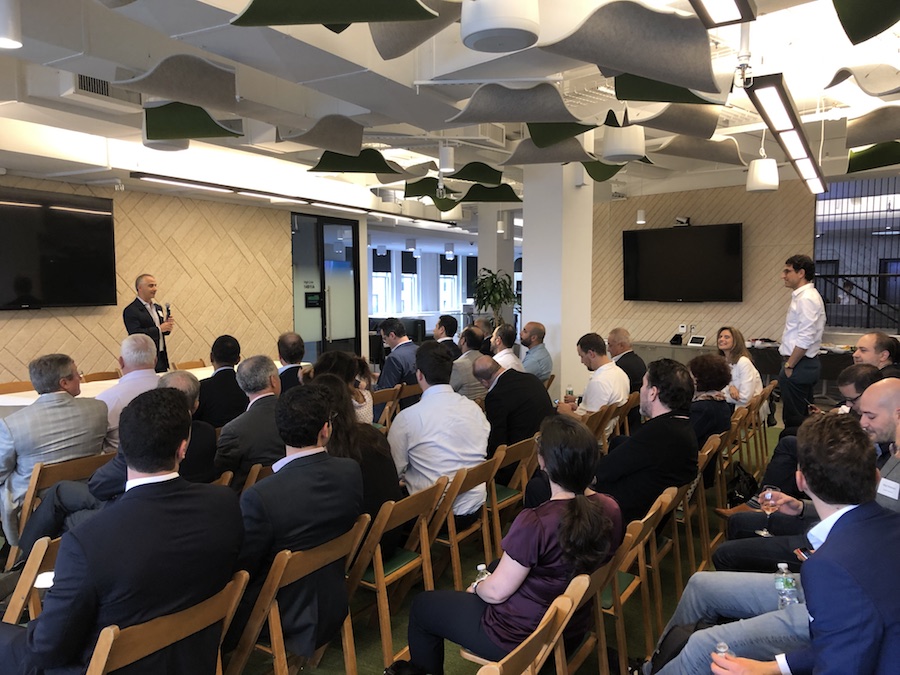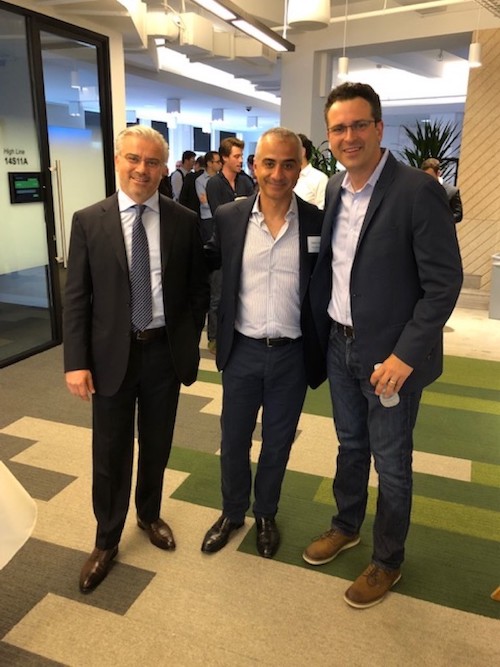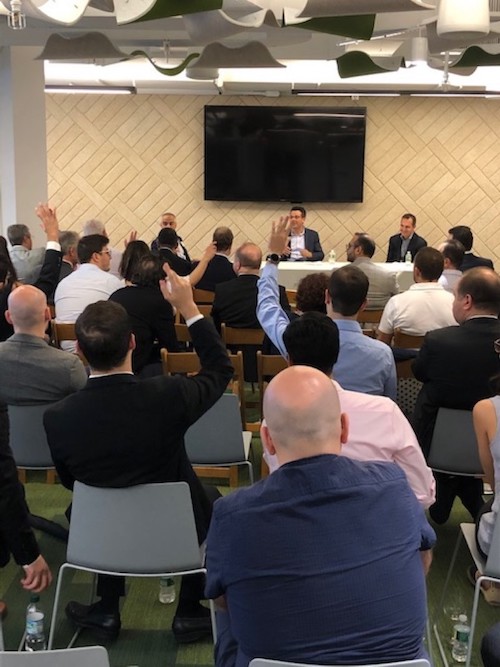New York - June 5, 2020
On June 5, LebNet and LIFE organized a fintech panel in New York on alternative online lending models. This event was hosted by Eli Curi, Tech startup, venture, and M&A lawyer at Fenwick & West and took place in their NYC offices which resemble more an innovation space than a law firm.
The panelists were Renaud Laplanche, the CEO of Upgrade, a platform that provides affordable personal loans, credit monitoring and personal credit line and the founder and former CEO of LendingClub; and Noah Breslow, the CEO of OnDeck, a platform that provides small business loans and lines of credit. The panel was moderated by Habib Kairouz, the Managing Partner at Rho Capital Partners.
Before delving into the topic of online lending in the US, panelists introduced their companies and explained how they’re using data to better evaluate users’ credit scores.

Bypassing traditional banks and providing capital to small businesses
Breslow comes from a purely technical background, having studied Computer Science and Engineering at MIT. He joined OnDeck in 2007 after his former company, Tacit Networks, was sold in 2006. The idea of giving loans to small businesses without going through a bank was revolutionary for him.
“We have 6,000 banks in the US and they are largely set up to give $2 million loans to small businesses. If you needed $20,000 only, the bank would apply the same process for the $2 million loan. Six to eight weeks go by and the business would decline. The bank would look at the personal credit score then make a decision, but the challenge is it doesn’t take into account what the underlying business model is,” Breslow said.
The other challenge is if the borrower maxed out on their personal credit card, they won’t be able to get any funding from the bank to grow their business. “Digital data helped us solve this problem and build the technology to digest the digital data of the business and make a loan decision in a fraction of the time and cost it takes a traditional bank.”
OnDeck enables small business owners to apply for a loan within few minutes, evaluates their business model and makes a decision within minutes. Today, the company has 700 employees, it processed 1.6 million loan applications, made nearly $12 billion of loans with an average loan size of $50,000 and is operating in the US, Canada and Australia. It went public in 2014.

So how does its evaluation system work?
OnDeck uses third party online payment processors to monitor how a certain business is performing in the present. It then downloads transaction and payment data from the small business checking account and credit cards. The process works in real-time and provides quick analysis.
“We don’t claim to replicate traditional banking. That process is very labor-intensive and costly. A commercial bank might ask for tax returns and if you’re a small business you rarely report income on your tax returns. The data is usually stale. Today your business could be better or worse than what that data shows.”
The company also learned by trial and error. OnDeck had to lend a billion dollars’ worth of loans to have enough defaults to build a good credit score, Breslow said. The source of their capital comes from financial institutions and credit funds.
Unlocking credit potential and lowering the cost
Laplanche earned an MBA in finance, co-founded and sold a company to Oracle before he started LendingClub then Upgrade. LendingClub is an online marketplace connecting borrowers and investors, facilitating personal loans, business loans, and financing for elective medical procedures and K-12 education and tutoring.
Both platforms are online consumer credit platforms. The LendingClub started as a peer-to-peer lending platform and then evolved today to 90% of its funding from institutions and 10% from retail investors.

In addition to traditional credit scores, credit history, and performance, the company uses technology to reduce cost of capital by looking at debt ratio and behavioural data that advertisers usually use to monitor time spent on certain websites and online activity and machine learning methods to make the best out of the available data they have.
An interesting topic raised by Kairouz was the required steps to scale the model to the Middle East and specifically Lebanon and the issue of the unbanked population in many countries.
OnDeck isn’t present in the Middle East but has international businesses in Australia and Canada, and may expand to other markets in the future. The alternative online lending models can be tricky by nature, according to Breslow, and require proper infrastructure and resources in order to flourish in a certain environment. In some countries, he said, anyone without a banking license isn’t allowed to lend money to people.
There’s also the problem of accessing data. In Lebanon for instance, the only way to access credit, account and payment data is through the Central Bank and this could be a major hurdle due to banking secrecy.
Yet such hurdles can be surpassed thanks to a high mobile penetration in the Middle East, accounting for 70% of the population in 2017. Mobile-based solutions can help business owners access behavioral data directly from telecommunication companies and network operators. African-based M-Pesa and Tala are two great examples. Their users can transact, pay and apply for loans using a mobile app.

Moving to the Q&A segment, topics varied between the emergence of competitors like Goldman Sachs and tech giants; access to data in the early stages, the pressure of moving to mobile; catering to larger businesses and the future of the fintech space.
“It’s all about innovation and market size,” said Laplanche in response to the competition question. With competition comes new ideas, so we can make the market better and create better products and solutions.”
He talked about access to data in the early stages saying: “There are no shortcuts, it’s a learning curve. You start with industry data, data from credit card securitization, enhance it with credit bureau data, ask for [credit history] and how they performed in the last 3 years.”
As for Noah, they obtained data about small business activity from payment processors. Unfortunately, it was not only the loans that performed, but bad loans that didn’t perform, that were required to build their credit models. “Your credit model won’t improve unless you do this.
For us, it wasn’t until we made about a billion dollars’ worth of loans that the model started to accelerate its capabilities. Do everything you can to acquire data and bootstrap until you get to that learning phase.”
The event was attended by 40 people and exquisitely moderated by Habib Kairouz, who jokingly reminded himself and the audience that he passed on an investment opportunity with Laplanche and Breslow years ago, yet now believes in the power of what they’re doing. Perhaps online lending models are tricky due to the heavy amount data they require, but the possibilities are endless even in the least expected markets.
